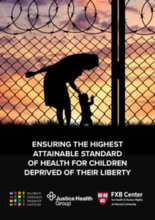A team of researchers from the Murdoch Children’s Research Institute (MCRI) in Melbourne, Australia, the Justice Health Group at Curtin University, and the François-Xavier Bagnoud (FXB) Center for Health and Human Rights at Harvard University collaborated on identifying, critiquing, and synthesizing current healthcare standards for children deprived of their liberty in order to shine a light on one of the most neglected areas in the protection of children. The report was made possible with seed funding from Murdoch Children’s Research Institute.
MCRI and Curtin University Professor Stuart Kinner said children who experience deprivation of liberty typically have health problems that precede and are further compounded by their experiences in detention. This population has a high prevalence of complex, co-occurring health needs, including high rates of mental illness, trauma, high risk substance use, chronic disease and neurodevelopmental disability that required coordinated, high-quality healthcare. Research from Australia has also reported that children released from criminal justice detention were at increased risk of preventable death.
This report considers healthcare standards in relation to the six settings considered by the United Nations Global Study on Children Deprived of Liberty (Global Study) including:
- detention of children in the administration of justice
- children living in prisons with their primary caregiver
- migration-related detention
- deprivation of liberty in institutions
- detention in the context of armed conflict
- detention on national security grounds
Informed by the United Nations System Common Position on Incarceration, the team concludes that there are important gaps and ambiguities in relation to the current international standards for healthcare for children across these settings.
The aim of the report is to identify gaps in the system and assist the United Nations Task Force (UNTF) in its efforts to support the implementation of the UN Convention on the Rights of the Child (UNCRC) and ensure that all children, including those deprived of their liberty in all settings, achieve the highest attainable standard of health. This report has drawn on the expertise and insights of a broad group of collaborators including members of the United Nations Task Force on the Implementation of the Global Study on Children Deprived of their Liberty.
Recommendations:
The authors make the following recommendations:
- The UN Committee on the Rights of the Child should clarify that all children, including those deprived of their liberty in all settings, have a right to the highest attainable standard of health.
- Consistent with this, to resolve inconsistency, the UN Committee on the Rights of the Child should either revise General Comment 24 or provide clarifying guidance to support interpretation and confirm that:
- Children detained in the criminal justice system have a right to the ‘highest attainable standard of health’, and that consistent with this;
- Health services in detention shall be of a standard equivalent to that available in the community at large.
- The Havana Rules, which were adopted by the UN General Assembly in 1990, should be updated to clarify that children in criminal justice detention should enjoy the same standards of healthcare that are available in the community, in line with other key UN instruments including the Convention on the Rights of the Child, the Convention on the Rights of Persons with Disabilities, the Beijing Rules, and the Mandela Rules.
- In line with the recommendations of the UN Global Study on Children Deprived of Liberty, and the commitments under the UN System Common Position on Incarceration, State parties, UNTF Members, UN and civil society organizations should jointly and individually partner with researchers in developed and developing countries to:
- assess the health needs of children deprived of liberty in all settings, importantly including mental health and both general and disability-specific health needs of children with disabilities;
- document and critically review healthcare governance and financing arrangements in all places where children are deprived of liberty;
- assess national legal and policy frameworks for compliance with international standards;
- document the nature and scope of healthcare available and delivered to children deprived of liberty in all settings, considering both compliance with relevant international norms and standards, and whether this healthcare is proportionate to identified health needs;
- identify and rigorously evaluate mechanisms for improving health outcomes for children who are deprived of liberty, informed by the evidence and in consultation with children and young people;
- systematically review and synthesise the evidence regarding health outcomes for children after deprivation of liberty, specifically including a review of the rates and causes of death in these young people.
- In line with the recommendations of the UN Global Study on Children Deprived of Liberty, and the commitments under the UN System Common Position on Incarceration, State parties, UNTF Members, UN and civil society organizations should collaborate on the development of practical technical guidance documents. These should be underpinned by the best evidence and based on good practices drawn from different country contexts, to support implementation of healthcare standards in all places where children are deprived of their liberty.
- The WHO should, in cooperation with relevant State parties, UNTF Members, UN and civil society organizations, seek to adapt its existing system for routinely monitoring and reporting on health status in European prisons, for implementation globally in all settings where children are deprived of liberty, so that regional and global progress towards these standards can be measured.

